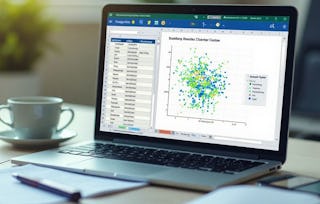Welcome to Cluster Analysis, Association Mining, and Model Evaluation. In this course we will begin with an exploration of cluster analysis and segmentation, and discuss how techniques such as collaborative filtering and association rules mining can be applied. We will also explain how a model can be evaluated for performance, and review the differences in analysis types and when to apply them.

Cluster Analysis, Association Mining, and Model Evaluation

Cluster Analysis, Association Mining, and Model Evaluation
This course is part of Data Science Fundamentals Specialization

Instructor: Julie Pai
4,985 already enrolled
Included with
47 reviews
What you'll learn
Cluster analysis and segmentation
Collaborative filtering and market basket analysis
Applications of classification- and regression-type prediction models
Skills you'll gain
- Probability & Statistics
- Unsupervised Learning
- Fraud detection
- Classification Algorithms
- Scatter Plots
- Collaborative Software
- Predictive Analytics
- Correlation Analysis
- Analysis
- Model Evaluation
- Machine Learning
- Anomaly Detection
- Regression Analysis
- Statistical Analysis
- Data Mining
- Market Analysis
- Skills section collapsed. Showing 9 of 16 skills.
Details to know

Add to your LinkedIn profile
2 assignments
See how employees at top companies are mastering in-demand skills

Build your subject-matter expertise
- Learn new concepts from industry experts
- Gain a foundational understanding of a subject or tool
- Develop job-relevant skills with hands-on projects
- Earn a shareable career certificate

There are 4 modules in this course
Welcome to Module 1, Cluster Analysis and Segmentation. In this module we will explore cluster analysis, a popular unsupervised learning algorithm. We will also review the two major styles of cluster analysis, and discuss potential applications to different industries.
What's included
2 readings1 discussion prompt
Welcome to Module 2, Collaborative Filtering, Association Rules Mining, & Market Basket Analysis. In this module we will begin with an explanation of collaborative filtering and association rules mining, and how these techniques are used to make automatic predictions. We will also take a closer look at the various common applications of market basket analysis.
What's included
1 video1 reading1 assignment
Welcome to Module 3, Classification-Type Prediction Models. In this module we will begin with an explanation of how classification-type prediction models are evaluated for performance, and how a confusion matrix can help visualize that performance. We will also discuss the applicability of cluster analysis, and how it can be used to detect rare events such as fraudulent transactions.
What's included
1 video2 readings1 discussion prompt
Welcome to Module 4, Regression-Type Prediction Models. In this module we will review how regression analytics are used for both hypothesis testing and prediction, and how a scatter plot can be leveraged to better understand the relationship between two variables. We will also discuss the differences between correlation analysis and a regression analysis, and a look at simple vs multiple regression.
What's included
1 reading1 assignment1 discussion prompt
Earn a career certificate
Add this credential to your LinkedIn profile, resume, or CV. Share it on social media and in your performance review.
Instructor

Offered by
Explore more from Data Analysis
 Status: Preview
Status: Preview Status: Free Trial
Status: Free TrialUniversity of Illinois Urbana-Champaign
 Status: Preview
Status: Preview Status: Preview
Status: Preview
Why people choose Coursera for their career

Felipe M.

Jennifer J.

Larry W.

Chaitanya A.
Learner reviews
- 5 stars
72.34%
- 4 stars
19.14%
- 3 stars
0%
- 2 stars
6.38%
- 1 star
2.12%
Showing 3 of 47
Reviewed on Mar 23, 2023
This course is fairly easy if you know something about statistics for data mining already. Well explained topics & also further reading suggestions are given, which is a bonus.

Open new doors with Coursera Plus
Unlimited access to 10,000+ world-class courses, hands-on projects, and job-ready certificate programs - all included in your subscription
Advance your career with an online degree
Earn a degree from world-class universities - 100% online
Join over 3,400 global companies that choose Coursera for Business
Upskill your employees to excel in the digital economy
Frequently asked questions
To access the course materials, assignments and to earn a Certificate, you will need to purchase the Certificate experience when you enroll in a course. You can try a Free Trial instead, or apply for Financial Aid. The course may offer 'Full Course, No Certificate' instead. This option lets you see all course materials, submit required assessments, and get a final grade. This also means that you will not be able to purchase a Certificate experience.
When you enroll in the course, you get access to all of the courses in the Specialization, and you earn a certificate when you complete the work. Your electronic Certificate will be added to your Accomplishments page - from there, you can print your Certificate or add it to your LinkedIn profile.
Yes. In select learning programs, you can apply for financial aid or a scholarship if you can’t afford the enrollment fee. If fin aid or scholarship is available for your learning program selection, you’ll find a link to apply on the description page.
More questions
Financial aid available,

